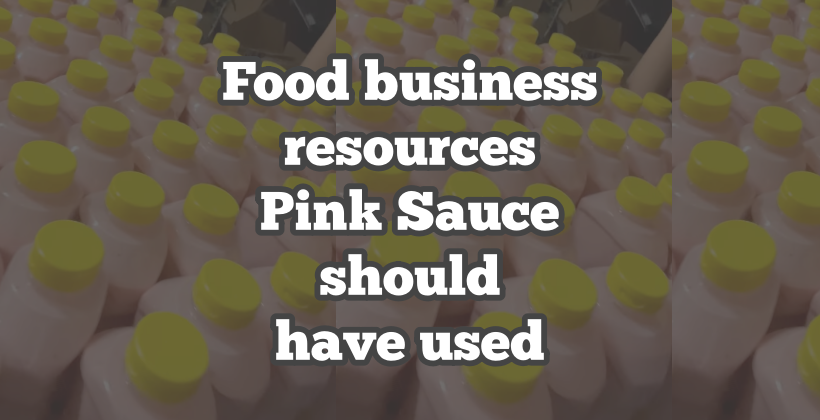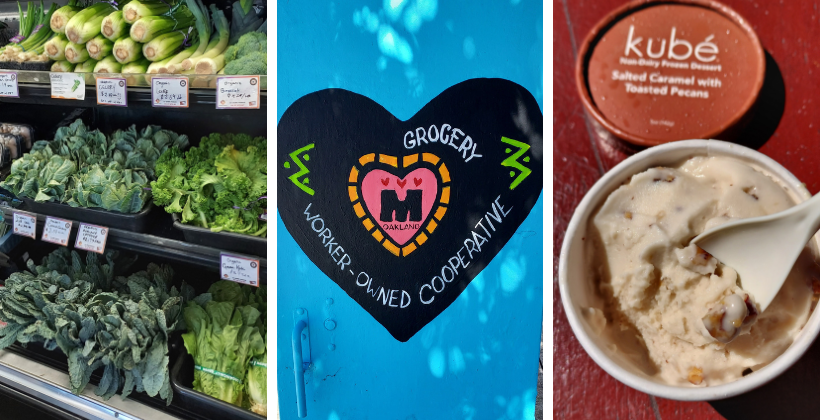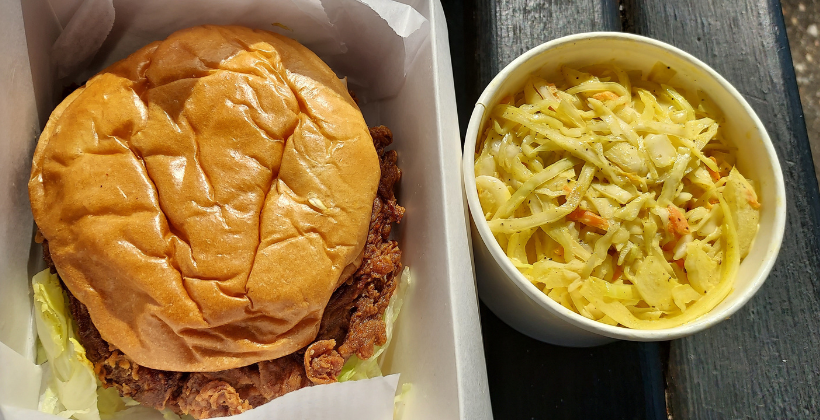
Food Business Resources Pink Sauce Should Have Used
If you thought Pink Sauce was done, you were wrong. Probably.
In the latest episode of the PINK Sauce saga, Pink Sauce will partner with Dave’s Gourmet to relaunch the sauce and sell it in stores. Dave’s Gourmet is using their commercial food production experience to make Pink Sauce a shelf stable product.
This would have been great before the disastrous and explosive (more on that later) launch.
I’m interested to see if these viral moments will translate to a long-term and loyal customer base.
In the meantime, I put together a few business resources so that you can avoid this series of unfortunate food events with your food business.
But first, let me give you a recap on the Pink Sauce debacle.
What is Pink Sauce? Why is it pink?
The short version: A woman created a mystery pink sauce that went viral, mainly due to all the controversies surrounding the creator and the sauce (inconsistent coloring, questionable shipping & packaging, etc).
The long version: Early summer, a Florida-based private chef & mixologist named Carly Pii, uploaded videos on social media of her eating several meals with ample servings of a mystery sauce in various shades of pink. It was a mystery, because in the earlier videos, Pii wouldn’t describe the flavor or the consistency of the sauce.
Social media comments described the appearance of the sauce as a cross between calamine lotion & watery ranch dressing. Eventually, Pii posted content of people tasting (and sometimes drinking) the sauce and giving their opinions and reactions. Many TikTok & Instagram commenters were skeptical, but there were plenty of comments asking when and where they could purchase Pink Sauce.
And why pink? Well, Pii says in this TikTok that she wanted to come up with a “crazy, innovative, off the wall sauce.” But colorful sauce isn’t new. If you’re a 90’s kid, then you might remember Heinz EZ Squirt ketchup in green and purple.
In only a few weeks, Pink Sauce has gone viral and racked up millions of views across several social media platforms. Pii started selling the sauce for $20 per bottle and of course, people bought it. Customers complained about:
- Bottle explosions during shipping due to the incorrect shipping & packaging process since the sauce isn’t shelf stable
- Incorrect serving size
- Milk not being listed in the ingredients list
- Inconsistencies in the sauce’s color
And this is the short version of the complaints list.
Now that you’re caught up, let’s get into the ‘how to start a food business’ resources.
Resources for starting & growing your food business
After learning that “how to start a restaurant/food business/food truck” collectively garner 100,000+ Google searches every month, I recorded the Free Food Business Resources podcast episode.
If you need help starting or growing your food business in the U.S., here are some resources you can try:
Food business / food truck / restaurant specific resources
Local cottage food laws & food regulations
Depending on your city, county, state, or country, your local government has most likely set laws and guidelines on how to start and operate a food business. These rules vary based on several factors such as the type of food you’ll make, how it will be served, and where the food will be prepared. Use these search terms & phrases to find information relevant to you:
- Cottage food laws in [your city/state/country]
- How to start a food business in [your city/state/country]
Local food & restaurant organizations & community kitchens
Connect and network with your local food community, which will likely include restaurant owners and staff, food truck owners and staff, commercial kitchens, food career and business meetups, and food professional organizations. These are usually tight-knit communities willing to share their learnings and collaborate with one another. Some tools to start with are Meetup.com and Facebook Groups. Use these hashtags when searching Instagram to find online communities of food & beverage creators & founders:
ServSafe certifications
Certifications and training for people in the food and beverage industry. Created by the National Restaurant Association, this series of education focuses on food safety in order to protect consumers from foodborne illnesses. This is excellent (and sometimes mandatory) training whether you run your own food business, work in a restaurant, or want to be a better home cook. There are options for self-study, or completing an instructor-led course either online or in-person.
Community college culinary programs
Local community colleges often have culinary & hospitality programs that will teach you how to start a career or a business in the food industry. You can take a few courses or enroll in a certificate or a degree. Courses vary depending on the program, but likely include: food safety, restaurant management, restaurant marketing, hotel management, how to determine food costs, customer service, and more. Use these search terms & phrases to find culinary programs available to you:
- Hospitality programs near me
- Culinary arts in [your city/state/country]
General business resources
Local public library
Librarians are expert researchers and can help you with market, customer, and competitor research. They have access and knowledge to a variety of tools that they can introduce you to and teach you how to navigate. Since libraries are essentially community centers, librarians and library staff might be knowledgeable about local organizations and initiatives that can help you with your food business, so don’t be afraid to ask. The public library often has free workshops about how to start a business, marketing ideas for your business, how to secure funding, etc.
US Black Chambers, Inc
The USBC is a national organization that leads several programs and initiatives that help grow and scale Black owned businesses. They’ve partnered with companies like Google, Amazon, and American Express on training programs, webinars and business accelerators. Some of these resources are only available to paid members of local chapters, however, their webinars are available to anyone on their YouTube channel.
The Small Business Administration (SBA)
The SBA helps you start and grow your business, navigate laws and taxes, secure funding, understand business insurance, government contracting, and more. They also have free and confidential business advising. Most SBAs have advisors that specialize in a particular industry or vertical, and they often have advisors who are well-versed in the food space.
You can meet with a business advisor when it works for your schedule. And you can meet with your business advisor in-person, over the phone, or through video conferencing. However, the first session is usually done in-person.
Business advisors/coaches can be expensive. They are worth the investment, but if you don’t have the funds yet, free business advising through the Small Business Administration can be a great option for you.
What food business resources did I miss?
Email me at hey [at] profoodmaker [dot] com, or tweet @profoodmakerpod to let me know.

